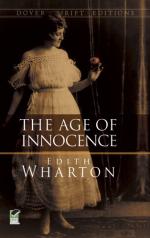These successive statements were received with the proper expressions of amusement, incredulity and gratitude; and the visit was breaking up in a vein of mild pleasantry when the door opened to admit the Countess Olenska, who entered in bonnet and mantle followed by the unexpected figure of Julius Beaufort.
There was a cousinly murmur of pleasure between the ladies, and Mrs. Mingott held out Ferrigiani’s model to the banker. “Ha! Beaufort, this is a rare favour!” (She had an odd foreign way of addressing men by their surnames.)
“Thanks. I wish it might happen oftener,” said the visitor in his easy arrogant way. “I’m generally so tied down; but I met the Countess Ellen in Madison Square, and she was good enough to let me walk home with her.”
“Ah—I hope the house will be gayer, now that Ellen’s here!” cried Mrs. Mingott with a glorious effrontery. “Sit down—sit down, Beaufort: push up the yellow armchair; now I’ve got you I want a good gossip. I hear your ball was magnificent; and I understand you invited Mrs. Lemuel Struthers? Well—I’ve a curiosity to see the woman myself.”
She had forgotten her relatives, who were drifting out into the hall under Ellen Olenska’s guidance. Old Mrs. Mingott had always professed a great admiration for Julius Beaufort, and there was a kind of kinship in their cool domineering way and their short-cuts through the conventions. Now she was eagerly curious to know what had decided the Beauforts to invite (for the first time) Mrs. Lemuel Struthers, the widow of Struthers’s Shoe-polish, who had returned the previous year from a long initiatory sojourn in Europe to lay siege to the tight little citadel of New York. “Of course if you and Regina invite her the thing is settled. Well, we need new blood and new money—and I hear she’s still very good-looking,” the carnivorous old lady declared.
In the hall, while Mrs. Welland and May drew on their furs, Archer saw that the Countess Olenska was looking at him with a faintly questioning smile.
“Of course you know already—about May and me,” he said, answering her look with a shy laugh. “She scolded me for not giving you the news last night at the Opera: I had her orders to tell you that we were engaged—but I couldn’t, in that crowd.”
The smile passed from Countess Olenska’s eyes to her lips: she looked younger, more like the bold brown Ellen Mingott of his boyhood. “Of course I know; yes. And I’m so glad. But one doesn’t tell such things first in a crowd.” The ladies were on the threshold and she held out her hand.
“Good-bye; come and see me some day,” she said, still looking at Archer.




